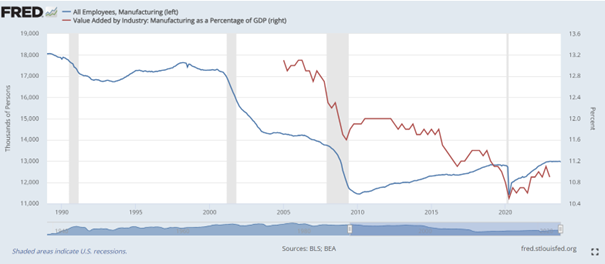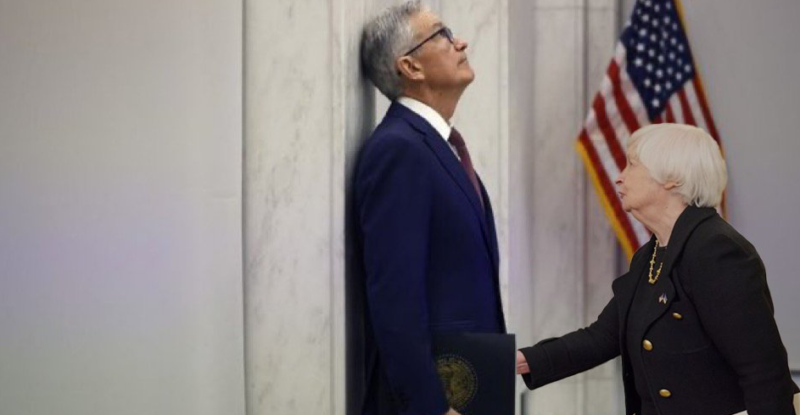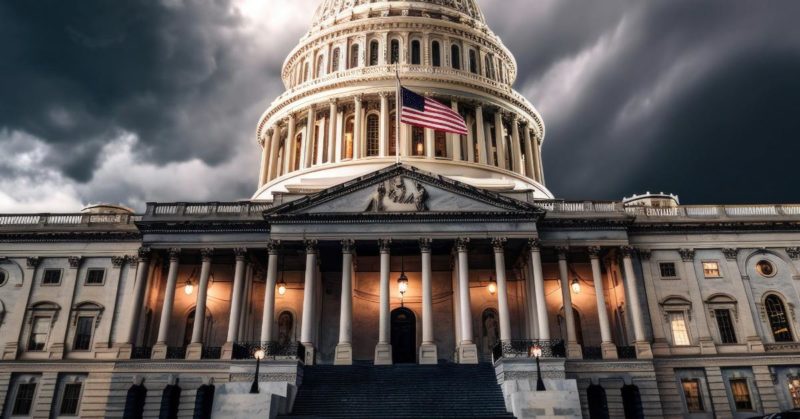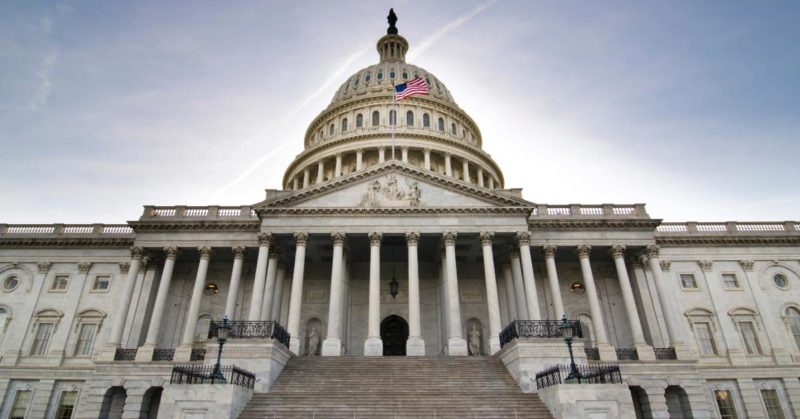Category Archive: 6b.) Mises.org
President Biden Is Wrong. Military Spending Does Not Produce Wealth
So far, the White House has justified its unwavering support for Ukraine on lofty grounds such as defending democracy and freedom—both in Ukraine and in the West. However, with the American public—who bears the cost of the war in Ukraine—turning against it, several Republican lawmakers questioning its purpose and affordability, and elections approaching, the Biden administration has changed the messaging on the war. Its new line is that sending...
Read More »
Read More »
Get Your Free Booklet by Joe Salerno!
There has been a radical change in the social and political landscape in this country, and any person who desires the victory of liberty and the defeat of Leviathan must adjust his strategy accordingly. New times require a rethinking of old and possibly obsolete strategies.–Murray N. Rothbard
Murray Rothbard wasn't only a brilliant economist, historian, and political philosopher; he was a man driven to defend the cause of liberty against the...
Read More »
Read More »
Will Powell’s Pivot Bail Out Biden?
For the last few years, Jerome Powell has remained constant: the Fed was ready to do anything necessary until inflation returned to its 2% target.
Today, Powell blinked.
While the Federal Reserve’s own optimistic projections place their preferred inflation measures staying above two percent until 2026, Powell used the December meeting to unravel the equivalent of a Mission Accomplished banner on the fight against inflation, potentially with the...
Read More »
Read More »
Should We Embrace the Stateless Roman Political Thought?
The concept of the state has more to do with the worldview of ancient Greek philosophers than with the Roman Empire. We could learn a few things about statelessness from the Romans.
Original Article: Should We Embrace the Stateless Roman Political Thought?
Read More »
Read More »
Africa Doesn’t Need More Government Aid; It Needs Free Markets
With a large regional market and youthful population, Africa should be on the cusp of greatness. Yet instead, it remains the poorest continent on earth. Analysts are conceding that Africa’s outlook is gloomy because the region is on track to miss poverty reduction goals. Successive African administrations have consulted multiple strategies to tackle the scourge of poverty with varying degrees of success; however, the plague of poverty has been...
Read More »
Read More »
Remembering the Great Henry Hazlitt on His Birthday
Henry Hazlitt, a great champion of liberty and Austrian economics, was born on November 28, 1894. His most famous book, Economics in One Lesson, remains a best seller thirty years after his death.
Original Article: Remembering the Great Henry Hazlitt on His Birthday
Read More »
Read More »
The Immorality of COP28
For the last two weeks, delegates from the world’s governments have met in the United Arab Emirates for COP28, the United Nation’s annual climate change conference. Over one hundred thousand attendees, ranging from heads of state to climate bureaucrats, corporate leaders, nongovernmental organization representatives, and activists, descended on the lavish Dubai venue to hash out new policies for governments to force on their citizens in the name of...
Read More »
Read More »
Overcoming Chinese Communist GDP Myths
While China achieved strong economic growth in the post-Mao years by allowing free markets to work, the Communist leadership wants to return the economy to its old socialist ways. However, while the government can give fake growth numbers, it cannot reverse socialist failures.
Original Article: Overcoming Chinese Communist GDP Myths
Read More »
Read More »
Can a Libertarian Find Hope in Prison? Maybe
Contrary to popular assertions, Ancapistan is a real place and is conventionally referred to as prison. In all seriousness, I have been living in the US federal prison system for four years now, and in many ways, prison society actually is fairly anarchic. Considering these societies (plural because prison culture is heterogeneous across geography and across institutions’ security levels) seriously should dispel any notions of humanity that could...
Read More »
Read More »
Bourne Again
David Gordon reviews Only a Voice, by George Scialabba, dealing with the author's comments on antiwar progressives Randolph Bourne and Dwight Macdonald.
Original Article: Bourne Again
Read More »
Read More »
The Anatomy of the Statist
The statist is a complex creature, composed of many parts, some of which are more obvious than others. No two statists are exactly the same, but many of them share a set of common elements. Studying these elements can shed light on why the statist is so wedded to their statism, and it can also shed light on what can be done to transform them into a civilized human being.
The following list of elements is by no means accurate or complete. This is,...
Read More »
Read More »
Napoleon: Europe’s First Egalitarian Despot
For those who value self-determination, free markets, peace, and freedom, Napoleon provides little to be admired. He was a despot, a warmonger, a centralist, and a hypocrite who claimed to spread freedom to justify his own lust for conquest and power.
Original Article: Napoleon: Europe's First Egalitarian Despot
Read More »
Read More »
How Did the U.S. Government Become So Big?
How big is the federal government? Two measures are the number of civilian employees (nearly two million) and the number of agencies (now exceeding 440). These numbers barely hint at their massive meddling into business activities and the personal lives of Americans.
While government was relatively small and less intrusive during its first hundred years, the Constitution held defects. In part, they resulted from the unavoidable compromises of...
Read More »
Read More »
Today Is the Best Day of the Year to Rob a Bank
Today, the Fed takes a short break from robbing us via inflation and, instead, delivers huge amounts of cash to banks to service Black Friday purchases. The large cash infusions often make banks vulnerable to robberies.
Original Article: Today Is the Best Day of the Year to Rob a Bank
Read More »
Read More »
Apartment Investment Syndication: A Predictably Unraveling Scheme, Thanks to the Fed
The apartment investment industry has experienced severe malinvestment over the last several years, resulting in a massive bubble that has only recently begun to deflate with rising interest rates. A tidal wave of easy money—enabled by the Federal Reserve and four consecutive United States administrations, from George W. Bush to Joe Biden—drastically lowered the barriers to entry. As a result, even those with no investment acumen have raised and...
Read More »
Read More »
The United States Needs Its Own Javier Milei
While the United States has not fallen as far economically as Argentina, the fact is that the present economic policies are ruinous. We need someone like Javier Milei to speak the truth about what is happening.
Original Article: The United States Needs Its Own Javier Milei
Read More »
Read More »
What Would Happen If the US Stopped Supporting Ukraine?
The standard line from US political elites is that failure to aid Ukraine would mean Russia's destruction of what is left of the country. However, the likely result would be a negotiated peace.
Original Article: What Would Happen If the US Stopped Supporting Ukraine?
Read More »
Read More »
Are Businesses Entitled to a Fair Profit?
One of the cliches of the New Deal was that businesses were entitled to a “fair” profit. Leonard Read astutely pointed out that profits (and losses) have nothing to do with “fairness.”
Original Article: Are Businesses Entitled to a Fair Profit?
Read More »
Read More »
The Oregon Problem
The Wall Street Journal reported last month that the ballot initiative to decriminalize all drugs in the state of Oregon is failing, and that efforts are underway to recriminalize hard drugs. Mark points out that decriminalizing drug possession does nothing to improve black market production of drugs, which makes drugs much more dangerous to consume. More importantly, it is Oregon's socialist ideology that coddles homelessness and open hard drug...
Read More »
Read More »
The Mixed Economy Model Still Disrupts Private Markets
Market processes rely on prices, which are not established by a government decree or by the randomness of the human mind but are instead determined by supply and demand. The consumer’s wants and needs are signaled through prices, which are in turn satisfied by the producers, who want to make a profit. Despite the success of this process, many still believe that government intervention is necessary to help the poor and to provide services that may...
Read More »
Read More »




























